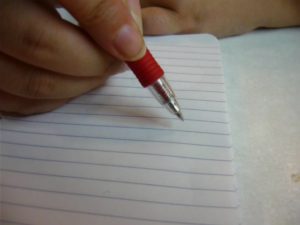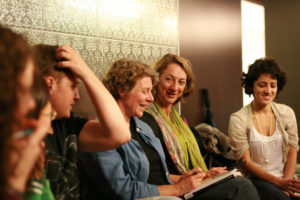In this post, Editor Jennifer Richards shares her tips on how she gradually fell in love with the re-drafting process, as editing exercises and tips and tricks helped her realise how vital re-drafting is for playwriting success!
Re-drafting a script used to be the dreaded monster I’d put off at all costs. It got to the point of not even wanting to write the script in the first place, knowing I’d just have to take a sledgehammer to it later. It seemed pointless to pour time and energy into a script knowing that I could end up with only a few lines from that original script making it into my final draft.

Of course that’s a very dramatic editing process, but I’ve always had a flair for drama! And I’ve learnt that it takes real determination to not mind, or even to like, the fact that I could go through 30 drafts with only one line from the very first script making it into the last one.
Now I’ve got to the point where I can actually enjoy getting to cut out characters, or moving where the story takes place, or even changing it from a four-hander to a monologue.
So here’s the tips and tricks I discovered to help make that re-drafting process fun rather than frightening…
1- Start with a blank page
Editing seems a lot more cruel when I’m actively having to cut out lines and move big chunks of text around. I found I’m a lot happier to make bigger changes if I start from a blank page again.
This doesn’t mean I need to re-write everything; I can just copy and paste across the bits I need, but it ultimately means I’m a lot more honest about the bits I definitely don’t need.
2- Get a buddy group
Sometimes when it comes to do what feels like my 30th draft (or, in some cases, my actual 30th draft), I find myself loosing interest in my story.
After having spent so long trying to get it right, it still doesn’t seem to be doing what I want. Often I’ve got so wrapped up in my own head that what I need is an outside perspective to give me a bit more clarity.
I’m lucky enough to be in a buddy group with three other playwrights, which has been incredibly helpful in having peope to offer feedback on bits of the script that I’m struggling with, or just as a way to soundboard ideas off of. It helps ignite that love for the story again and make me feel like maybe, yes, I can give the 51st draft a go.
3- Remember you’re not the story
When I write something more personal, it’s hard to distance myself from the story. And though that can definitely make it very hard when it comes to reading reviews, it can even make it difficult to edit.
When something feels so close to you, it’s a struggle to look at it objectively and decide what is and isn’t necessary for the narrative. Yes this one detail may be really important to me, but does it actually matter to the story? I constantly have to remind myself I’m not editing out my history or any of the real story I’m basing the play off of, I’m just making the best play that I can.

4- Take your characters out of the script
I’m someone who has a total fear of wasting time. So the idea of spending time doing writing exercises rather than writing the actual script makes me feel a bit nauseous. But it’s actually a great way of exploring characters.
Whether that’s freewriting an extra scene that maybe the audience don’t see on stage but I’d like to explore, or putting two characters together who don’t interact during the play and making them have a cuppa, it’s a great way of putting life back into the script.
This means redrafting seems like creating something new and exciting rather than a chore, which makes that editing process a whole lot more enjoyable!
And if you want to find out about more tips for the re-drafting process, you can become an LPW member to get access to our new re-drafting toolkit that’ll help you tackle all those editing problems!


